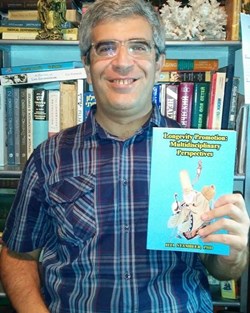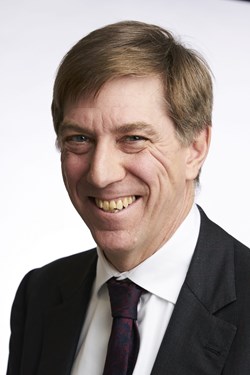
Photo via Shutterstock.com
The State of Israel will soon turn 71. And yet this babe among nations ranks fifth internationally for average life expectancy and conducts some of the world’s most critical research on healthy aging.
That is the conclusion of “Longevity in Israel,” a new 575-page report from the London-based Aging Analytics Agency in cooperation with Vetek (Seniority) – The Movement for Longevity and Quality of Life and the Israeli Longevity Alliance.
The open-access report cites no fewer than 60 “longevity influencers” (mainly researchers in the field of geroscience), 10 R&D centers, 10 non-profit organizations, 10 annual conferences, 160 companies associated with aging-tech solutions, and 180 investors in the Israeli longevity sphere.

Map showing the rich ecosystem of geroscience research and aging-related enterprises in Israel. Courtesy of the Aging Analytics Agency
Citing Israel’s “highly mature academic geroscience landscape,” the report states: “For a number of years, Israel has outputted high-volume, high-quality research into the fundamental biology of aging and potential healthspan extension interventions.”
The report, one of a series of regional case studies of the longevity industry, points out that all seven Israeli universities have, or will soon have, labs or interdisciplinary centers dedicated to aging research.

“This has happened nowhere else in the world and should be applauded,” says Eric Kihlstrom, director of the Aging Analytics Agency.
Three of the most prominent Israeli researchers listed are Valery Krizhanovsky of the Weizmann Institute, whose lab studies how senescent (deteriorating) cells affect cancer, aging and age-related diseases; Haim Cohen, head of the Molecular Mechanism of Aging Lab at Bar-Ilan University; and Michal Schwartz, also of the Weizmann Institute, whose lab created the groundwork to develop immunotherapy for Alzheimer’s disease.
“Israel is one of the most advanced countries in recognizing the role of aging research in the development of health and medicine policy, and in terms of actual research,” Ilia Stambler, chief science officer of Vetek, tells ISRAEL21c.

Prof. Haim Cohen, a geroscience researcher at Bar-Ilan University. Photo: courtesy
Vetek is a nonprofit that advances biomedical aging and longevity research in Israel toward achieving healthy longevity and prevention of aging-related diseases in Israel and internationally.
Stambler, 47, earned his PhD at Bar-Ilan and studies the historical and social implications of aging and life-extension research. He is outreach coordinator of the International Society on Aging and Disease, chairman of the Israeli Longevity Alliance, coordinator of Longevity for All and the author of two books on longevity.
He says that among the most exciting research directions in Israel today is computational modeling of the aging process and the efficacy of possible interventions, using machine learning and big data.
Unusually long lifespan
In 1948, when Israel was established, average life expectancy for citizens was 64 years for men and 67 for women. Today that figure has risen to 80.7 years for men and 84.2 years for women.
In the UN World Happiness Report issued last year, Israel ranked fifth on the longevity scale after Japan, Korea, Switzerland and Italy.

More importantly, says Stambler, the average Israeli will be in good health until age 73, one of the highest healthy life expectancies in the world.
“This means that for most of their lives, Israelis are healthy. We are in the top segment of the world. But we have a lot of work to do to decrease the number of unhealthy years at the end of the lifespan.”
Kihlstrom tells ISRAEL21c his greatest aspiration is to see healthy life expectancy increase on par with life expectancy.
“To address that aspiration, what Israel is doing is world-leading,” he says. “There is a national strategy and money is going into science and global collaborations.”
Kihlstrom notes that the Israeli government is developing a groundbreaking master plan on aging that will recommend actions to take on age-related issues such as housing and healthcare.
Stambler’s group wants this plan to include an emphasis on research, development and education for promoting health and longevity and preventing age-related diseases.
Other initiatives include the Israel Ministry of Science and Technology’s Program for the Scientific and Technological Infrastructure for the Elderly, and the Prime Minister’s Innovation Prize focusing on healthy aging.
Research collaboration with the UK
The Britain Israel Research and Academic Exchange Partnership (BIRAX) launched a £5 million collaborative project, BIRAX Aging, last June to “advance innovative scientific research into aging and its impact on human health and to encourage the use of cutting-edge technology, big data and personalized medicine in aging research.”
The group of more than 1,000 scientists from 120 institutions includes four Nobel Prize winners and three members of the UK House of Lords. Supported by many foundations and charities, some of BIRAX Aging’s initial targets are Parkinson’s, Alzheimer’s, heart disease, multiple sclerosis and diabetes, multimorbidity and frailty.
Its first conference, held last September at King’s College London, brought together 80 leading Israeli scientists with British peers to discuss the problem of demographic aging and possible solutions.

“Both the British and Israeli governments have taken a progressive stance in response to the socioeconomic challenges posed by demographic aging,” says Kihlstrom, formerly interim director of the UK’s Healthy Ageing Industrial Strategy Challenge Fund.
“BIRAX Aging may be the first government initiative that explicitly aims to directly treat aging, including targeting the underlying cause of age-related diseases,” says Kihlstrom.
“We are looking to create an ecosystem of innovation with technology, science and investment, with a legislative environment around it. We want to make it easier for people to invest in this space.”
The Israeli Longevity Alliance is co-organizing a major conference in September 2019 at the Weizmann Institute, cosponsored by US National Institute on Aging. Speakers will include world-leading geroscientists such as Dr. Nir Barzilai, the Israeli director of the Institute for Aging Research at Albert Einstein College of Medicine in New York.
Working with Prof. Gil Atzmon, head of the Laboratory of Genetics and Epigenetics of Aging and Longevity at the University of Haifa, Barzilai’s Longevity Genes Project discovered that people with exceptional longevity have genes that delay aging or protect against age-related diseases.
